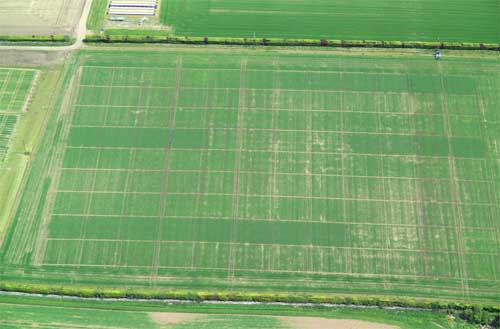Latest Briefing for 2010
Towards a low-nitrogen future
Efficient use of nitrogen (N) by plants is critical for maintaining future crop productivity as artificial fertilisers become more costly to produce. Global N fertiliser use for crop production has increased approximately seven-fold in the last 50 years, enabling crop production to keep pace with population growth. However, the economic and energy costs of high N inputs to arable systems are not considered sustainable.
Production of artificial N fertilisers is expensive, requiring conversion of N gas into inorganic N, which relies on fossil fuels. The cost of N fertilisers has more than doubled in recent years, and prices are likely to increase further as fossil fuel supplies become limited. In addition, uptake and use of N fertiliser in cropped systems can be inefficient.
Globally, it has been estimated that only one-third of the N fertiliser applied to cereal crops ends up in the harvested grain. The N in agricultural soils is a major source of greenhouse gases such as nitrous oxides, and N can also be lost through leaching of nitrates into water courses. There is an urgent need for alternative crop management strategies to allow sufficient food production for human populations without exhausting global resources.
A combined approach is required to reduce our reliance on artificial N fertilisers for crop production. The key questions are:
- What are the alternatives to chemically-synthesised N fertilisers? We need to consider alternative sources of N, including recycled farmyard and urban organic waste and green manures.
- Can existing crop varieties maintain yield and quality with less artificial fertiliser and/or alternative fertilisers? We need new crop genotypes that are more efficient in the use of inorganic and organic forms of applied nitrogen.

Figure 1: Compost and slurry trials at Mylnefield, SCRI, showing the enhanced early development of the barley crop when quality green compost is used.
Read morePublished on 21 December 2010 in Sustainability and Communities
Briefings for 2010
The role of muscle in appetite control
Exercise is a lifestyle change that is often tried alone or in conjunction with diet to reduce weight and has beneficial effects on metabolic health in addition to weight loss. Read more
Published on 10 December 2010 in Food, health and wellbeing
Berry components may influence fat digestion and obesity
In Scotland, 1 in 4 adults can be categorised as obese with all projections suggesting an increasing trend over the next decades. Read more
Published on 6 December 2010 in Food, health and wellbeing
Stopping the benign microbes all around us becoming pathogenic to plants
Pathogens of plants and animals can be present on crop plants with no visible symptoms. New evidence from molecular detection methods is revealing that many microorganisms enter several different relationships with plants during their life cycles. Read more
Published on 1 December 2010 in Sustainability and Communities
Poxvirus Infections: Important threat to both animal and human health
Poxviruses cause painful diseases in animal and humans, threatening both health and productivity. Moredun researchers have identified potential treatments for the major pox virus in the UK but further research is required to protect both livestock and human health in the future. Read more
Published on 25 November 2010 in Food, health and wellbeing
Improving phosphorous supply in organic agriculture
Supply and availability of phosphorous (P) is one of the major limiting factors in organic production systems. Read more
Published on 23 November 2010 in Sustainability and Communities
Berries may improve insulin sensitivity in type 2 diabetics
Diabetes presents a serious health challenge for Scotland. The genus Vaccinium (e.g. blueberry, blaeberry), has been used traditionally as a source of folk remedies for established diabetic symptoms. Read more
Published on 23 November 2010 in Food, health and wellbeing
Probiotics and Prebiotics: effects on the gut microbiota
There has been a significant increase in the number of food products containing either probiotics or prebiotics reaching the supermarket shelf in recent years and the myriad of health claims associated with these products is very confusing. Read more
Published on 11 November 2010 in Food, health and wellbeing
Potato Nutritional and Sensory Quality
In the UK the potato supply chain is of major economic importance. In Scotland the seed potato industry is particularly important and there is a strong demand for new improved cultivars that can compete internationally. Read more
Published on 28 October 2010 in Food, health and wellbeing
The use of Vaccination and diagnostics to support the sustainable control of Ectoparasites
Sheep scab (caused by the sheep scab mite Psorptes ovis) is endemic in the UK and is one of the most important diseases for the sheep industry. Read more
Published on 25 October 2010 in Sustainability and Communities , Food, health and wellbeing
Diet and Deprivation
Social disadvantage in the UK persists throughout life and across the generations and is proving increasingly difficult to overcome. Read more
Published on 21 October 2010 in Food, health and wellbeing







